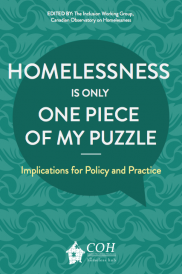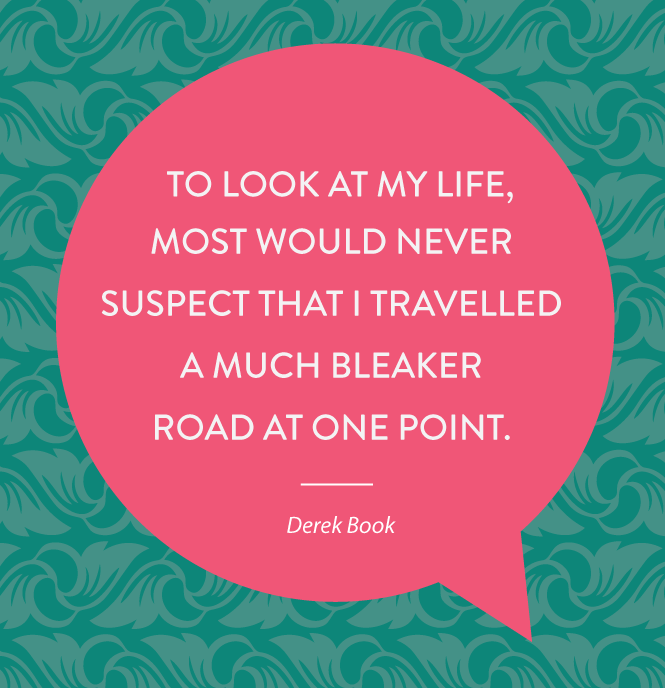This is an excerpt from the Homelessness is Only One Piece of My Puzzle: Implications for Policy and Practice book.
A large question has framed my experiences as I moved through different stages of my life: how is it that I have managed to find so much success considering my background as a homeless person? Currently, I am a professional case planner and outreach worker with a non-profit service provider. I have assisted in getting hundreds of homeless people into addictions or mental health treatment, and hundreds more into affordable housing arrangements. I have connected with so many clients on such a deep level that many see me as a lifesaver. I have coordinated emergency shelter programs and assisted in developing homeless counts. I have two beautiful children and a happy life in what I consider to be one of the finest cities in the world. I am involved in my community, university-educated, physically active and healthy. To look at my life, most would never suspect that I travelled a much bleaker road at one point. That road begins in 1969, when I was born into a multi-generationally broken Métis family in Ontario.
My mother had some pretty major mental health issues. I believe she self-medicated with alcohol to survive the pressure of being a single mother of two children on income assistance. We moved around like crazy. I don’t remember ever finishing a whole year at one elementary school; as such, I was perpetually the new kid.
Attending school was not always a given in my family. At times, my mother became very unstable and we often found ourselves sleeping in transition houses, abandoned houses and even abandoned vehicles. Sometimes, my mother informed us that we were “camping,” when both my sister and I knew there was no home to return to after the said “camping trip.” My mother was at times delusional, believing that a complex network of landlords, bikers, social workers and mafia was stalking our little trio. She often left our housing in fear, relocating to another city to avoid children’s services or the “Whispering Fools.”
You see, the “Whispering Fools” were chasing our little family. They were bent on tormenting us and converting us to Satanism, or worse. They would come around at night and hang outside our windows, taking small birds and squeezing them until they squeaked to elicit terror in our hearts. They would follow my sister and I home from school – my sister would carefully count how many times a car had circled the block just to make sure the driver was “in on it,” and faithfully report the information to mom when we got home. Being younger, I wasn’t as interested in this tracking and would spin around in circles pretending I was flying—kick pebbles or cola cans and fill my head with imaginary places to escape. I knew something serious was going on with my mother and sister because they would spend hours each night going over evidence of stalking, but I reasoned that they would take care of it somehow.
Our family thrived on and lived for this drama. Other families may have played Clue or watched Alfred Hitchcock in the evenings, but our family was fully engaged in a drama more exciting than anything on TV. The story of how a single mother on welfare could elude and outsmart the Whispering Fools was all so exciting.
We had to move constantly to keep one step ahead of this “evil network.” While this led to very precarious financial situations and much loss in personal belongings, it made us feel empowered and free of their evil grasp. We might have slept in an abandoned shack (or occasionally a car) in the middle of the woods, but they were never going to get us, never! Food was scarce, but it was better to raid garbage cans or gardens and cook up what we found than to submit to the authorities for assistance, because we knew that the authorities were part of the “evil network.”
It was impossible to avoid the system, however, maybe because my mother required a cheque each month to get by, or perhaps because my sister and I had the occasional “nosy” teacher who would trigger an investigation. My sister and I knew what to say when they interviewed us; we had been well schooled in espionage and resistance. It was so easy for me to chuckle and say that everything was fine, and ask innocently, “Did I do something wrong?” This would make the interviewer backpedal and apologize for accusing our family of suspicious behaviour. By the time I was seven, I was a master of the interview. The early development of those communication skills surely landed me more jobs than I can count later in life.
It wasn’t always enough, however, to smile and say things were okay. Sometimes the facts were so evident that my sister and I were placed in state custody. I distinctly remember being placed in a childcare center called Merrymount with my sister when I was in grade three. Merrymount was full of kids, perhaps hundreds, and my sister and I had to sneak away from the staff when we could to collaborate on strategies. We knew that our mother was in the hospital, but we didn’t know why or for how long. Thank goodness the staff didn’t have the time to drill us for information, because we may have slipped up without the strong hand of our mother to guide us. We did our time, carrying out the chores assigned to us in a robotic fashion.
Mom got ‘better’ from whatever ailed her, and we threw ourselves into her arms as she came to pick us up from the kid factory in London, Ontario. We were on the move again. She informed us, as we exited, to put all of this behind us.
We picked up where we left off, except she seemed to drink a lot more. That was not a good thing because it meant that the money became scarcer, and that she became scarcer. Her drinking also threatened to expose our family, because sometimes we would be locked out of the house, waiting on the stairs for hours for her to come home drunk and angry. My sister was a rock during these times. She helped my mother get in the house and to bed. She knew exactly how to calm her down so she didn’t throw anything. My mother was a thrower; she would throw the closest thing in range squarely at your head if she didn’t like how things were, with no regard for the potential consequences. I learned this the hard way when I was five and she whipped a padlock at me, leaving a permanent, seven-stitch scar on my forehead.
When I turned 12, my mother informed me that I would be living with my dad in Prince Rupert for a while. I thought this was odd because I had never met him. All I knew of him was that he lived in British Columbia and worked as a carpenter. I lived with him for the next two years and discovered he was also a pretty unstable, transient alcoholic, but at least he held down a job and paid the bills. He also sent me to a few counsellors. I remember hearing one of them say if I could be honest with myself, the rest of it would work itself out. I resolved that I would always be as honest with myself as I could. After two years of living with my dad, he kicked me out. I guess he got tired of dealing with my lateness and irresponsible behaviour. But who knows? I returned to live with my mother, but by that time I had already given up on being raised by any blood relation. It didn’t really matter anymore, as I knew it was only a matter of time before I set out on my own.
Hitting the streets at 15 was the least of my worries. I had lost all hope, all connection to and all faith in the society around me. I remember sleeping in a parkade on a piece of cardboard when I was 16, waking up periodically when a businessperson would uncomfortably walk around me. I was shocked and angry every time: I had no clue how a person could walk by such a tragedy without so much as a word. My bitterness from being neglected by nearly every human I had encountered expressed itself in a rant to a street outreach worker one day. I flatly stated that I would never become “one of those people.” His answer resonated with me for years to come, and triggered a turning point in my self-awareness:
“What makes you think you would be one of those people, if you got off the street?”
.............
 |
Read the rest of this story in the Homelessness is Only One Piece of My Puzzle: Implications for Policy and Practice book. Download it for free at: http://homelesshub.ca/onepieceofmypuzzle |


